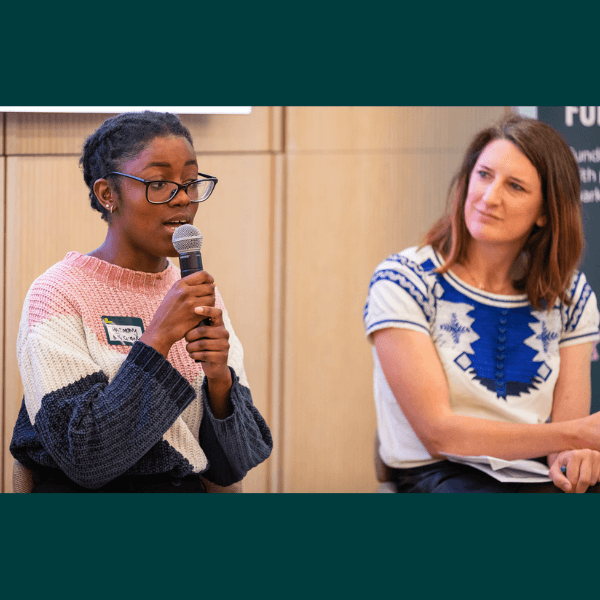
Helping Young People Take Charge of Their Future
By Jenny Anderson and Rebecca Winthrop, authors of The Disengaged Teen: Helping Kids Learn Better, Feel Better, and Live Better.

Is student agency the missing piece in creating engaged learners?
Cara Kennedy got the highest SATs results her school had ever seen. She entered high school full of confidence, in a "gifted and talented" class, but then started to coast.
And when complications arose in her personal life, she began resisting the system: skipping homework, missing classes and eventually, refusing to go to school.
“School wasn’t somewhere I wanted to be. So I just didn’t go," she recalled in May at the event The Disengaged Teen: Supporting Student Agency in Times of Uncertainty, co-hosted by Big Change and The Brookings Institution at the House of Lords.
But through RECLAIM, a Big Change partner organisation founded by Ruth Ibegbuna, dedicated to unlocking agency in young people, Cara was asked to write down her response to the question that changed her future: “What’s not working about the education system right now?”
“We filled that paper quickly,” Cara said. She and seven other young people explored their own diverse experiences—being neurodivergent, Black, working-class, or having adverse childhood experiences—to reimagine and create a space to educate and support young people. That space would become Rekindle, another Big Change partner organisation founded by Ruth Ibegbuna: a supplementary school in Manchester that supports young critical thinkers from working-class communities.
During COVID, she ran a survey with 350 young people from Greater Manchester. What she and her colleagues found was that the education system didn’t feel relevant. “We lack life skills. We don’t learn about taxes, for example. Arts funding is being stripped back, and there’s no joy or love of learning anymore.”
The Disengaged Teen
Three years ago, we set out to understand why so many young people did not like what they did in school. Our research included The Brookings Institution and Transcend surveys of more than 65,000 young people and almost 2,000 parents. We followed 100 teens for three years to understand their journey. We interviewed hundreds of educators, neuroscientists, academics, and nonprofit leaders to understand what was and was not working.
We found an epidemic of disengagement, and a lot of the same messages Cara heard. Our survey showed that more than 75% of children in primary school say they love school; by ages 15–16, that figure drops to just 25%.
We also found kids show up in four modes of learning, which are influenced by how they feel, their home and school environments, and how capable they feel in class. Cara talked about these modes when describing her own educational journey. These are not labels or identities but rather dynamic modes, shaped by individuals and their environments:
- Passenger Mode – coasting, doing the bare minimum to get by.
- Achiever Mode – striving to be perfect, trying to get gold stars in everything put in front of them.
- Resister Mode – often dubbed “problem children” these kids act out or withdraw, using their voice to let us know something is wrong.
- Explorer Mode – where kids are developing the muscles to be proactive over their learning. These kids dig in, ask questions about what they are curious about, set goals, and adapt along the way. They are deeply engaged in learning.
Kids need agency—the ability to set meaningful goals and marshal the resources to meet them. They need ways to express what they care about and build the future they want.
The bad news? Our research indicates that less than 4% of kids have the chance to be in Explorer Mode in secondary school.
Our book outlines different strategies to help young people who get stuck in Passenger, Achiever, or Resister mode. But a few universals apply:
- Kids need agency—the ability to set meaningful goals and marshall the resources to meet them. Like Cara, they need ways to express what they care about and build the future they want. This is even more critical in an age of AI. Adults need to offer chances to develop this agency—to make real choices and to have genuine power.
- Discussion matters. We say in the book that discussion is to adolescents what cuddles are to infants: necessary for brain development. Young people are becoming critical; thinkers and discussion is a key way they form ideas. Adults need to model curiosity and possibility and interest in the young people they work with and around. We can be the bridge between what happens in a classroom or outside it and the world around them.
- Lean into their interests. Adolescence is a time of wanting to stand out and fit in. They are trying on many identities—as they should. Don’t take away the things they love if they aren’t achieving in school: you cannot make any child love learning but you can provide opportunities for them to develop interests at which point the energy comes from them, not from you.
If you're a parent, teacher, or someone engaged with children and young people, and want to help cultivate agency in them, you can order a copy of the book here.

